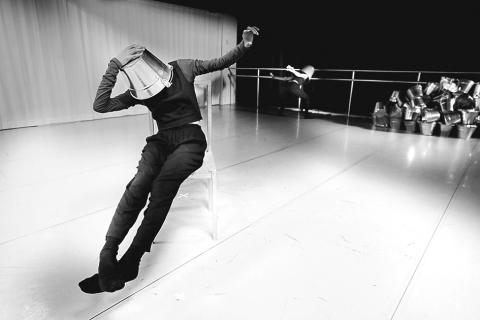The Tainan-based Scarecrow Contemporary Dance Company (稻草人現代舞蹈團) is back in Taipei this week to perform choreographer Luo Wen-jinn’s (羅文瑾) newest work, Dripping (詭‧跡).
Luo’s last work at the Experimental, Singular(單‧身), in June last year, was well-designed and engaging, though given its depressing outlook on life it could hardly be called enjoyable. Her Unbreakable City (攣‧城) at the Songshan Cultural and Creative Park the following November was an interesting piece of theater in terms of set and sound installation, though it suffered from a lack of dance.
Luo, who has been the 26-year-old troupe’s artistic director for more than half its existence (17 years), has a reputation for thoughtful, quirky pieces and she’s usually worth betting on, especially given the challenging literary works she cites as inspiration — it is fun to compare the worlds she portrays to the authors’ own writings. For example, Paul Auster’s The Invention of Solitude is key to Singular, while Italo Calvino’s Invisible Cities led to Unbreakable City.

Photo Courtesy of Jou Bogi
This time it was rereading Jean-Paul Sartre’s Nausea that inspired Luo.
She said that she recognized her own estrangement, anxiety, unease and confusion as she read the novel, and the absurdity of situations that she has been in.
“Like Antoine Roquentin from the novel, I keep questioning what is the meaning of my existence, how I would choose to create my own freedom,” Luo said in an e-mail. “Existence is not just philosophical thinking; it’s the action we choose to do motivating by our own consciousness every day. Existence is a true and strange being.”
Luo has drastically downsized for this weekend’s show, going from the eight dancers of Singular and seven for Unbreakable City to just two: herself and company member Li Pei-shan (李佩珊), who is also listed as co-creator of the work.
In Dripping, Luo and Li exist their own parallel time and space, sensing and experiencing the same absurd situations and actions, which are influenced by water dripping from the ceiling and hundreds of buckets.
For the score, Luo turned to Misa Wen (米莎), bassist Monlieng Lee (孟濂) and percussionist Tsai Yi-cheng Tsai (蔡易成), who will be performing live during the show.
Luo originally called the work Wind Scar in English, and that is what appears on the posters and ticketing sites, although the Chinese title (詭‧跡) remains the same.
“Dripping is the key element and plays a very important role in this dance so I decided to change original title to Dripping, which is more appropriate,” she said.

In the March 9 edition of the Taipei Times a piece by Ninon Godefroy ran with the headine “The quiet, gentle rhythm of Taiwan.” It started with the line “Taiwan is a small, humble place. There is no Eiffel Tower, no pyramids — no singular attraction that draws the world’s attention.” I laughed out loud at that. This was out of no disrespect for the author or the piece, which made some interesting analogies and good points about how both Din Tai Fung’s and Taiwan Semiconductor Manufacturing Co’s (TSMC, 台積電) meticulous attention to detail and quality are not quite up to

April 28 to May 4 During the Japanese colonial era, a city’s “first” high school typically served Japanese students, while Taiwanese attended the “second” high school. Only in Taichung was this reversed. That’s because when Taichung First High School opened its doors on May 1, 1915 to serve Taiwanese students who were previously barred from secondary education, it was the only high school in town. Former principal Hideo Azukisawa threatened to quit when the government in 1922 attempted to transfer the “first” designation to a new local high school for Japanese students, leading to this unusual situation. Prior to the Taichung First

Chinese Nationalist Party (KMT) Chairman Eric Chu (朱立倫) hatched a bold plan to charge forward and seize the initiative when he held a protest in front of the Taipei City Prosecutors’ Office. Though risky, because illegal, its success would help tackle at least six problems facing both himself and the KMT. What he did not see coming was Taipei Mayor Chiang Wan-an (將萬安) tripping him up out of the gate. In spite of Chu being the most consequential and successful KMT chairman since the early 2010s — arguably saving the party from financial ruin and restoring its electoral viability —

The Ministry of Education last month proposed a nationwide ban on mobile devices in schools, aiming to curb concerns over student phone addiction. Under the revised regulation, which will take effect in August, teachers and schools will be required to collect mobile devices — including phones, laptops and wearables devices — for safekeeping during school hours, unless they are being used for educational purposes. For Chang Fong-ching (張鳳琴), the ban will have a positive impact. “It’s a good move,” says the professor in the department of